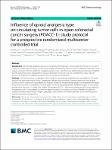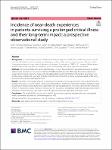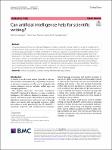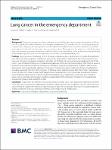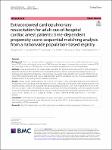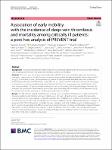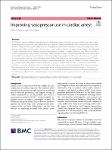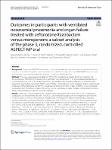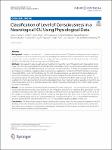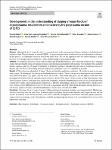Search
Author
- Daqing, Ma (3)
- Alexis, Ferré (2)
- Anna, Lybeck (2)
- Ashish K., Khanna (2)
- next >
Subject
- intensive care unit (8)
- acute respiratory dist... (5)
- chronic obstructive pu... (5)
- ICU (5)
- next >
Date issued
Has File(s)
Search Results
Opioids and epidural analgesia are a mainstay of perioperative analgesia but their influence on cancer recurrence remains unclear. Based on retrospective data, we found that cancer recurrence following colorectal cancer surgery correlates with the number of circulating tumor cells (CTCs) in the early postoperative period. Also, morphine- but not piritramide-based postoperative analgesia increases the presence of CTCs and shortens cancer-specific survival. The influence of epidural analgesia on CTCs has not been studied yet. |
So far, the few prospective studies on near-death experience (NDE) were carried out only in intensive care unit (ICU) patients with homogeneous aetiologies, such as cardiac arrest or trauma survivors. The aims of this 1-year prospective and monocentric study were to investigate the incidence of NDE in ICU survivors (all aetiologies) as well as factors that may affect its frequency, and to assess quality of life up to 1 year after enrolment. |
This paper discusses the use of Artificial Intelligence Chatbot in scientific writing. ChatGPT is a type of chatbot, developed by OpenAI, that uses the Generative Pre-trained Transformer (GPT) language model to understand and respond to natural language inputs. AI chatbot and ChatGPT in particular appear to be useful tools in scientific writing, assisting researchers and scientists in organizing material, generating an initial draft and/or in proofreading. There is no publication in the field of critical care medicine prepared using this approach; however, this will be a possibility in the next future. |
Though decreasing in incidence and mortality in the USA, lung cancer remains the deadliest of all cancers. For a significant number of patients, the emergency department (ED) provides the first pivotal step in lung cancer prevention, diagnosis, and management. As screening recommendations and treatments advance, ED providers must stay up-to-date with the latest lung cancer recommendations. The purpose of this review is to identify the many ways that emergency providers may intersect with the disease spectrum of lung cancer and provide an updated array of knowledge regarding detection, management, complications, and interdisciplinary care. |
There is inconclusive evidence regarding the effectiveness of extracorporeal cardiopulmonary resuscitation (ECPR) for out-of-hospital cardiac arrest (OHCA) patients. We aimed to evaluate the association between ECPR and neurologic recovery in OHCA patients using time-dependent propensity score matching analysis. |
Association of early mobility with the incidence of deep-vein thrombosis and mortality among critically ill patients: a post hoc analysis of PREVENT trial |
The Chain of Survival highlights the effectiveness of early recognition of cardiac arrest and call for help, early cardiopulmonary resuscitation and early defibrillation. Most patients, however, remain in cardiac arrest despite these interventions. Drug treatments, particularly the use of vasopressors, have been included in resuscitation algorithms since their inception. |
The pivotal ASPECT-NP trial showed ceftolozane/tazobactam was non-inferior to meropenem for the treatment of ventilated hospital-acquired/ventilator-associated bacterial pneumonia (vHABP/VABP). Here, we evaluated treatment outcomes by degree of respiratory or cardiovascular dysfunction. |
Impaired consciousness is common in intensive care unit (ICU) patients, and an individual’s degree of consciousness is crucial to determining their care and prognosis. However, there are no methods that continuously monitor consciousness and alert clinicians to changes. We investigated the use of physiological signals collected in the ICU to classify levels of consciousness in critically ill patients. |
Although the term “major fracture” is commonly used in the management of trauma patients, it is defined insufficiently to date. The polytrauma section of ESTES is trying to develop a more standardized use and a definition of the term. In this process, a standardized literature search was undertaken. We test the hypothesis that the understanding of “major fractures” has changed and is modified by a better understanding of patient physiology. |

